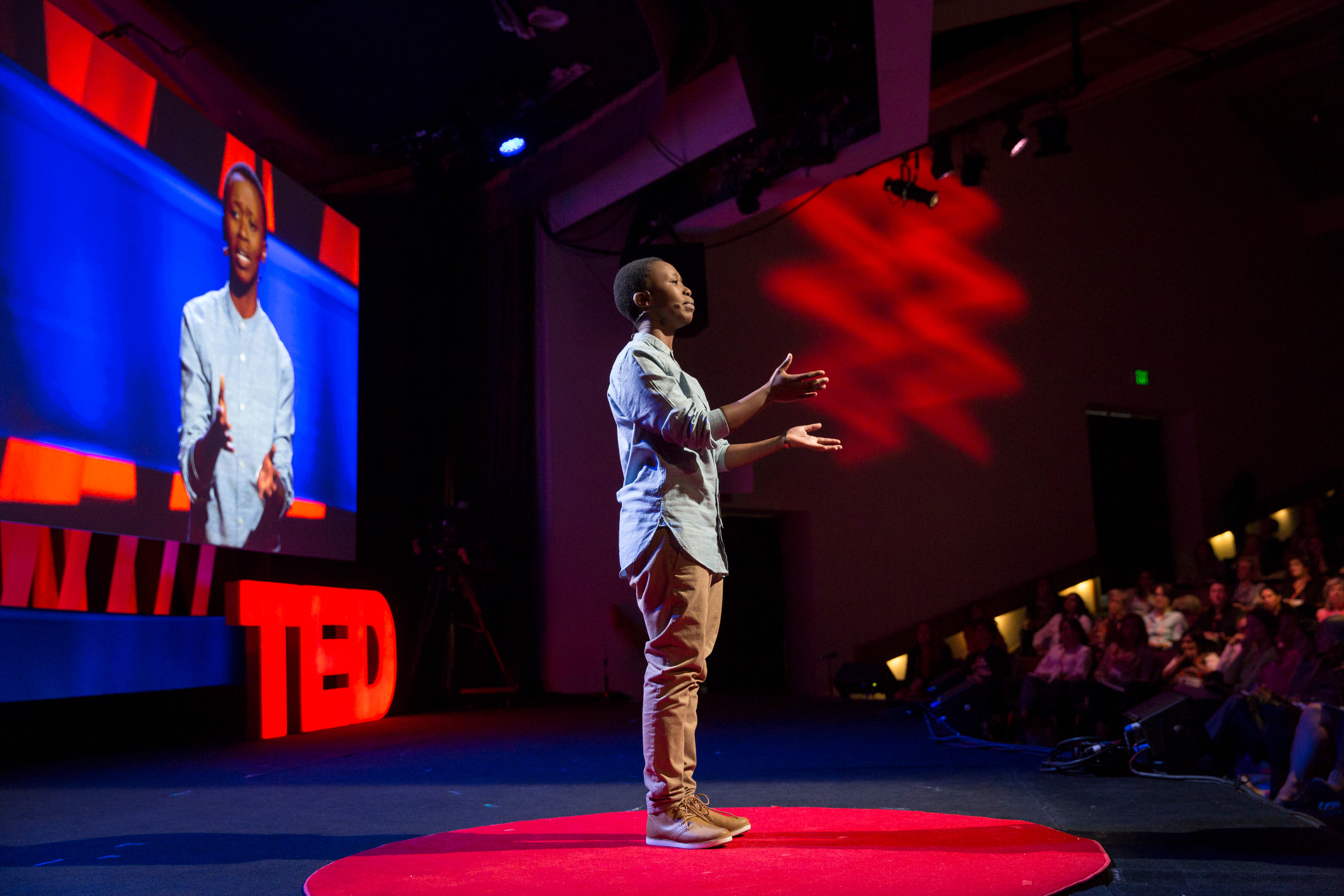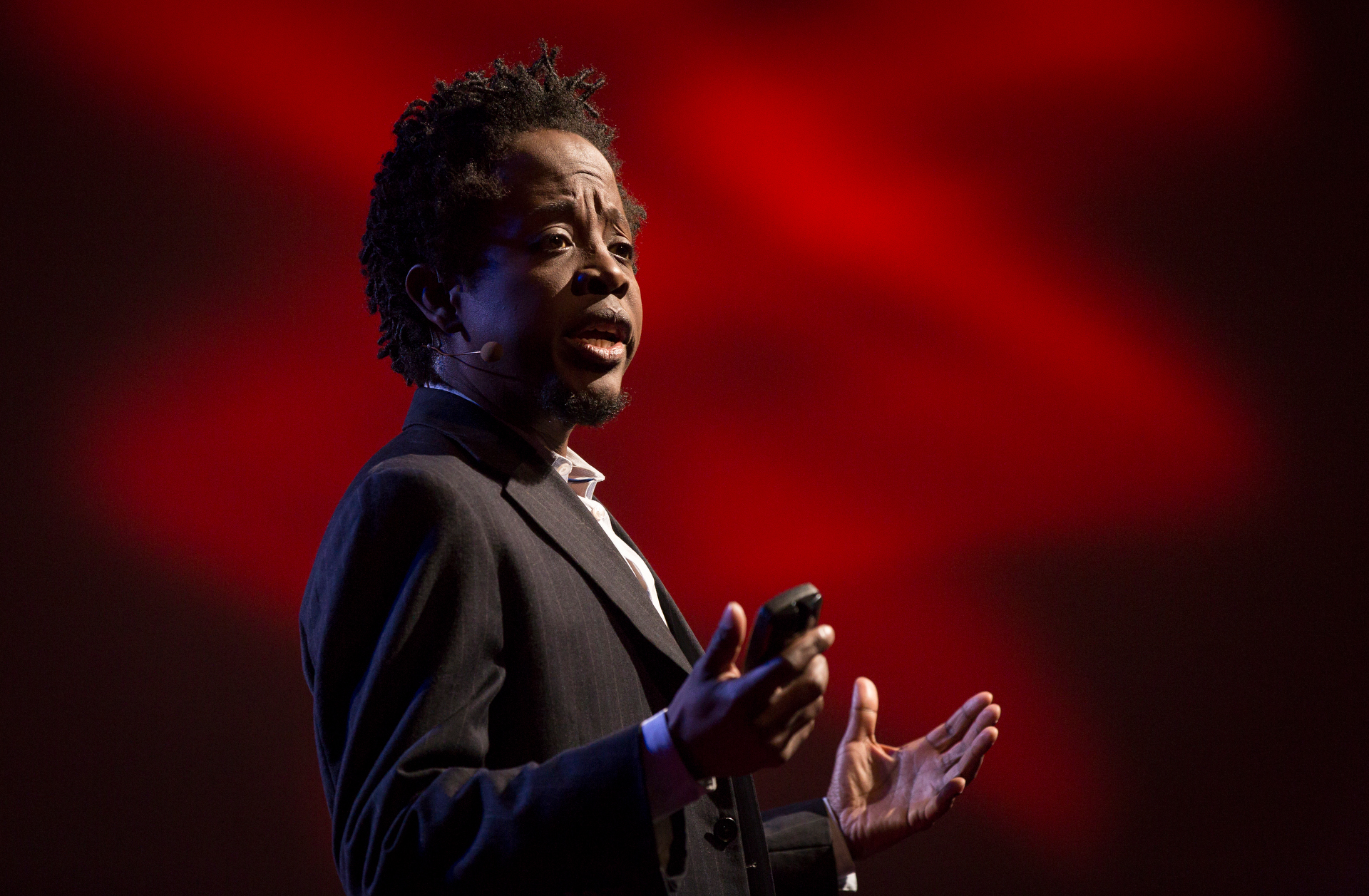
Margaret Hefferman offers a radical reframe of work: that highly connected at teams do better than teams with stars. Photo: Marla Aufmuth/TED
Some ideas simmer below the surface. This session is dedicated to speakers who bubble them up, from a surprising management thinker to an Ebola researcher who found new inspiration in a song.
Short recaps of the talks in this session…
Work, the ultimate social experience. Margaret Heffernan is here to flip our thinking on what makes teams productive. It isn’t about brilliant individuals — it’s about a cohesive group working well together. She shares an MIT study that asked hundreds of volunteers to solve problems in groups. What did the most successful groups have in common? Not high IQs, not star leaders. Instead, they had high social sensitivity to each other, they were not dominated by a single voice and they contained more women. “What happens between people counts,” says Heffernan. “In groups highly attuned and sensitive to each other, ideas can flow and people don’t get stuck.” As she points out, “Companies don’t have ideas. Only people do. And what motivates people are the bonds of loyalty and trust they develop around each other.” This idea has big implications, says Heffernan, who recently wrote a TED Book, Beyond Measure, on this idea. It means redefining how we groom talent — by stopping the focus on stars and giving teams enough time to develop a working dynamic. This idea also gives new meaning to leadership, she says: “We need to redefine leadership as an activity in which conditions are created so everyone can do their most courageous thinking together.”
Two parts of the same whole. Elizabeth Nyamayaro remembers the first time she experienced what it was to feel unequal. She was 10, and famine had hit her native Zimbabwe, so she was sent to live with an aunt. For the first time, Nyamayaro went to school … and she was behind. It was this feeling of inequality that would carry her into her work for HeforShe, a campaign founded by the United Nations that asks men to stand by women in the fight for gender equality. The premise is simple: to uplift all of us together. Does it work? Can men, “the enemy,” really fight for women? Well: In just three days, more than 100,000 men signed up, and 1.2 billion conversations started on social media. The campaign rippled around the world: A man in Zimbabwe started a “husband school” – rounding up the abusive husbands in his village to teach them how to be good men. And incredibly, thanks to this campaign, the Swedish government has committed to close off the equal pay gap for all citizens within the current electoral term. Because, says Nyamayaro, men and women are really two parts of one whole. “It’s not our gender that defines us,” she says, “but, ultimately, our shared humanity.”
Confessions of a bad feminist. Roxane Gay‘s book is called Bad Feminist. Pink is her favorite color. She loves fairy tales. And she listens to rap even though the lyrics “offend me to my core.” In a funny, honest talk, she explores the meaning of the word “feminist” and our baggage with it — and looks at how we use the word to further tear women down. Feminism ultimately comes down to choices, she says. They aren’t always easy to make, but these “small acts of bravery … trickle up to the people in power.” Read much more in a full recap of this talk »

Lee Mokobe wrote a poem especially for TEDWomen. Photo: Marla Aufmuth/TED
A walking casket. Lee Mokobe, a tiny fireball of a 19-year-old, delivers a powerful performance about coming out as transgender. The poet and TED Fellow says, “I was the mystery of an anatomy — a question asked but not answered.” Calling on God, his mother, Bruce Jenner and all the people who don’t see him as human, Mokobe is at once sincere and self-effacing, laughing while he breaks our hearts. He describes becoming comfortable with his body the way he wanted to, and his mother’s fear that he would become a “what a shame” conversation at bus stops, a “walking casket.” Mokobe closes by wondering: “How much time it will take before the trans suicide notes start to feel redundant / how fast we will see that our bodies become lessons about sin way before we learn how to love them.”
Welcome to whitopia. Rich Benjamin spent two years living in the fastest-growing, whitest counties in America. Did we mention that he’s a black man? He tells of his time in three places — St. George, Utah; Coeur D’Alene, North Idaho; Forsyth County, Georgia — and shares his experiences playing golf, going to poker nights and shooting guns with the locals. He even crashed an Aryan Nation three-day retreat up in northern Idaho. What he found: While these white people chose to live in segregated communities away from people who looked like him, they were actually quite kind to him personally, inviting him to their barbecues and attending his dinner parties. It gave him a clue into what racism in America looks like now. “It’s possible for people to be in whitopia without racist reasons, but with racist outcomes. I learned in whitopia how a country can have racism without racists,” he says. “One black man is a delightful dinner guest; 50 black men is a ghetto.” Black and white, we are able to connect as individuals, but not yet as communities. “The danger of whitopia is the more segregation we have, the less we can confront our conscious and unconscious bias.”
Fighting viruses with joy. Computational geneticist Pardis Sabeti earned her chops fighting Lassa fever, a fatal virus similar to Ebola, in West Africa. Each morning she gathered with her colleagues to sing and start the day by showing joy. “We weren’t just there to pursue science together,” says Sabeti, “we were bonded by a shared humanity.” This is a lesson she carried with her when Ebola broke out from Guinea and Liberia to Sierra Leone in March 2014, while she was working in Kenema, Sierra Leone. Quickly she and her team fought to respond to the tidal wave of cases – they sent deactivated samples of the virus back to her lab in Boston for sequencing, and watched as it mutated across cases. Her lab generated 99 genomes of Ebola — and instead of waiting for a publication credit, they put it out for scientists around the world to study. “I could have worked in a silo by myself — that’s the status quo,” says Sabeti, “but that wasn’t going to work.” The world’s great virus trackers were able to follow the virus as it changed. But the 106 clinical records Sabeti’s team gathered weren’t enough to help predict risk accurately – and while they waited for more samples, doctors and other healthcare workers, including Sabeti’s mentor, Dr. Humarr Khan, died trying to treat victims. “Ebola is fueled by mistrust and distraction and division,” says Sabeti, and we can’t accept work done in silos. She recalls her team’s tradition when they were fighting Lassa fever: “It can only happen if we do it together — and we do it with joy.”

Rich Benjamin lived in the three whitest counties in the US to figure out how a country can have racism without racists. Photo: Marla Aufmuth/TED
Comments